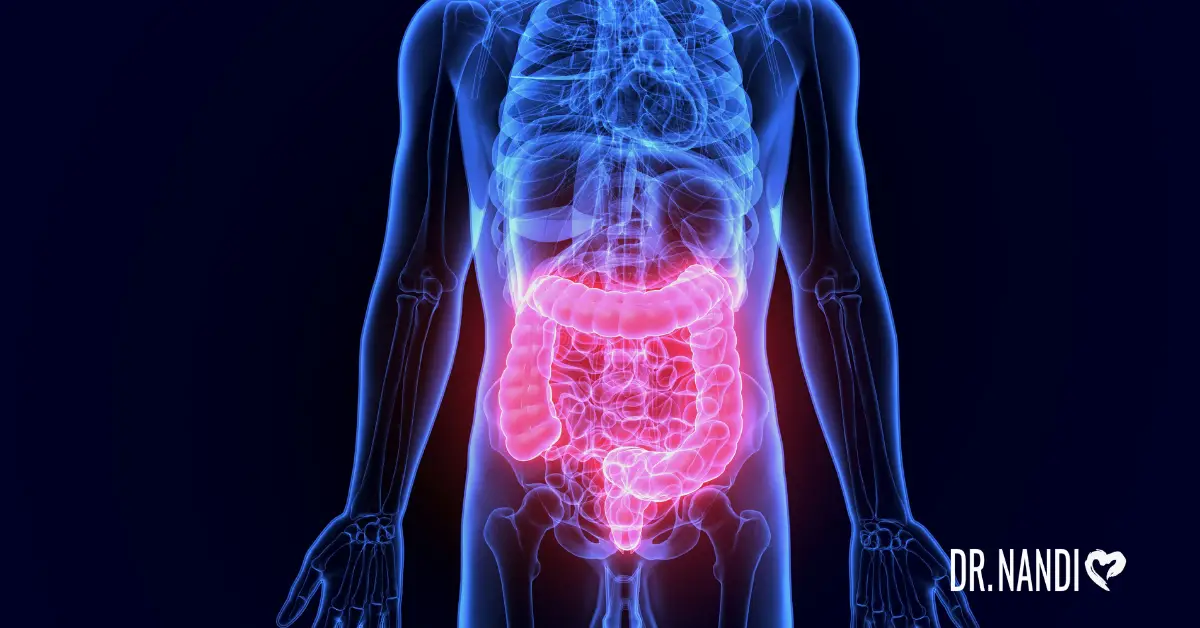Imagine having a condition with severe and debilitating symptoms and then having your doctor tell you that it is a functional or psychosomatic disease, suggesting that it’s all in your head. If you or a family member has irritable bowel syndrome, you may understand how frustrating this situation can be. And yet this is the case for many of the 39 million people in the United States with IBS. (1)
Guide To Heal Irritable Bowel Syndrome (IBS)
Throughout my practice as a physician, I have worked with thousands of patients who have struggled with IBS and helped them lay out a plan to overcome it.
What Is Irritable Bowel Syndrome (IBS)?
Irritable Bowel Syndrome is a chronic disorder that affects the large intestine. It produces several symptoms, including abdominal pain and abnormal bowel motility such as diarrhea, constipation, or both. Although IBS is a chronic condition, most patients I have worked with showed only moderate symptoms that could be kept under control with a well-managed diet, lowered stress level, and a healthy lifestyle. Those with severe symptoms of IBS may need additional medication and counseling to manage the symptoms entirely. (1, 2)
IBS occurs most commonly in those under 50 and is more common in women than men. IBS is also higher for those with mental health issues such as depression or anxiety or if you have someone in your family who has suffered from IBS. (2)
IBS is a functional disorder (or functional gastrointestinal disorder) involving the gut and the brain. If the gut-brain interaction isn’t running as smoothly as it should be, this can cause your gut to be more sensitive and change how the muscles in your bowel contract. It can lead to the symptoms I mentioned before, such as constipation and diarrhea. (1)
IBS generally does not include any visible signs of damage or disease in your digestive tract and doesn’t cause changes in bowel tissue or increase your risk of colorectal cancer. However, it is a chronic disease, which means you will generally need to learn to manage it long term. Although it may seem daunting at first, I have helped many patients manage this condition using the steps listed below. (2)
Irritable Bowel Syndrome Symptoms
- Abdominal pain. You may experience cramping or bloating or the feeling that you haven’t quite finished a bowel movement. (3)
- Excess gas. IBS may cause excessive gas, which can also lead to a sense of being bloated. (4)
- Diarrhea. IBS can cause diarrhea and sudden urges to have a bowel movement. (1)
- Constipation. IBS can cause constipation or hard and lumpy stools and strain during bowel movements. (1)
- Mucus in the stool. If you suffer from IBS, you may find a whitish mucus in your stool. (3)
Is Irritable Bowel Syndrome Curable?
Unfortunately, IBS is a chronic condition without a definitive cure. However, throughout my practice, I have found many different and successful ways to treat IBS so that it is no longer debilitating. I have worked closely with my patients and found the lifestyle changes, diets, medicines, including probiotics that worked best for them.
Are IBS and IBD The Same Thing?
Although both IBS (irritable bowel syndrome) and IBD (inflammatory bowel disease) can have similar symptoms, there is not the same thing.
Inflammatory bowel disease is a chronic condition where part of the digestive tract becomes inflamed. This disease can include ulcerative colitis and Crohn’s disease. Irritable bowel syndrome is also a chronic disorder, but one that does not have inflammation in the GI tract. (5)
Are IBS And Leaky Gut The Same Thing?
IBS and leaky gut (or intestinal permeability) are separate conditions. Leaky gut is a condition in which the lining of the intestines has large cracks or holes which allow partially digested food, toxins, and bugs to be released and penetrate the tissues beneath it. Although IBS and leaky gut are different, those with leaky gut may be prone to IBS and vice versa. (6, 7)
7 Step Plan To Heal Irritable Bowel Syndrome
As can be expected, I have found that many patients feel embarrassed to talk to other medical professionals about IBS and the symptoms involved or me. Fewer than one in five people with symptoms of IBS even seek medical help despite the debilitating symptoms. (8)
Although talking about IBS may be uncomfortable, ensuring that you get the correct type of treatment is essential. You are not alone in your digestive struggles, and you don’t have to live with these symptoms. I have helped thousands of patients find relief even after decades of suffering from IBS by simply following the steps below.
1. Get Diagnosed
Most adults will experience constipation, diarrhea, bloating, and abdominal pain from time to time, and some more frequently than others. There can be many causes for these symptoms; the first step I suggest you take if you suspect you have IBS is to visit your doctor and get a firm diagnosis. That way, you can be sure of your specific condition and know exactly how to move forward in the healing process.
When patients come to me for this diagnosis, I will first review their symptoms and medical and family history and perform a physical exam. Some cases may require additional testing such as endoscopy to rule out other health problems such as IBD, celiac disease, or colon cancer.
2. Temporarily Remove Any Processed/Inflammatory Foods From Your Diet
Once a patient has been diagnosed, I will review dieting strategies to improve their condition. Because IBS involves the digestive system, diet is an essential factor.
I have found that some triggers for IBS can be processed and inflammatory foods throughout my practice. I encourage my patients to focus on removing these foods from their diet first to see if their symptoms improve.
Some examples of processed and inflammatory foods to avoid are foods with refined flour such as white bread and pastries, fried foods such as french fries, red meats, processed meats, and soda and other sugary beverages. For some patients removing dairy and gluten from their diet can also be helpful. (9)
This step is often the most challenging for my patients, but it is also beneficial and essential. The American lifestyle has thrown whole foods out the window and replaced them with freezer meals, packaged foods, artificial ingredients, and fast foods. I realize the difficulty of sifting through all of this to eat right.
But you won’t have to avoid these types of foods indefinitely. Once you get your gut back in good health, you can slowly add these foods to your diet in moderation. I often recommended the 80/20 rule, 80 percent healthy foods and 20 percent less healthy foods. This way, you can ensure that you eat the wholesome nutrition your body needs while still getting the occasional treat. The key is moderation and balance.
3. Consume Gut-Healing Foods Daily
Along with avoiding certain foods, the next step is to consciously add foods into your diet that will help heal the gut. It’s incredible the wonders that a wholesome diet of natural, real foods can do. In addition to a whole food diet, some foods will go the extra mile for your digestive system.
- Water
- Kefir
- Amasai
- Yogurt
- Fresh vegetable juice
- Steamed vegetables
- Avocados
- Coconut oil
- Clean, lean protein
- Fruit
4. Remove Unwanted Bacteria
The next step to managing IBS is to remove the unwanted bacteria from your gut. As bacterial overgrowth can cause bloating and IBS, I will often prescribe certain medications that can combat this to my patients. 200 mg of rifaximin (Xifaxin) three times a day for 7 to 10 days can do the trick. Talk with your doctor to find the proper method for you.
5. Replenish Your Microbiome
Your microbiome is located in your gut and other parts of your body. When your microbiome is balanced, your gut health improves and your mood and energy. To help my patients replenish their microbiome, I suggest eating fermented foods daily.
Some of the best-fermented foods are:
- Kefir
- Yogurt
- Kombucha
- Sauerkraut
- Kimchi
- Pickles
- Tempeh
- Miso
If you cannot eat many fermented foods, a probiotic supplement is the next best option. Take a high-quality probiotic 1-2 times daily for at least 100 days.
6. Take Digestive Enzymes With Meals
The next thing I recommend to patients is to try taking digestive enzymes along with each meal. Sometimes your body just needs a little extra help breaking down your food. In reality, your body doesn’t absorb food; it absorbs nutrients. Your body must fully digest your food before it can benefit from it. Some people just need a little boost in the digestive process to ensure that their food is being processed and broken down completely.
7. Healing Supplements & Remedies
- L-glutamine powder: L-glutamine is an amino acid found in protein-rich foods and is great for helping treat IBS. (10)
- Aloe vera juice: Aloe vera can help soothe and heal the digestive tract and improve bowel regularity. (11)
- Fish oil: Fish oil can help to reduce gut inflammation (12)
- Slippery elm: Slippery elm can help heal irritated digestive tract tissues. (13)
- Ginger: Ginger root helps to relieve nausea and cramps associated with diarrhea. It also can help with inflammation and abdominal pain. (14)
Frequently Asked Questions
Will irritable bowel syndrome show up on a colonoscopy?
A. No. A colonoscopy is used to check for irritated and swollen tissue, ulcers, polyps, and cancer. Since IBS often does not show any visible signs of tissue damage, a colonoscopy is typically not required to diagnose IBS. A colonoscopy is necessary to rule out any other diseases.
Is irritable bowel syndrome hereditary?
A. Yes. It can be. Those with a family history of IBS are more likely to have IBS themselves.
Where does irritable bowel syndrome cause pain?
A. The most common area for pain with IBS is in the abdomen. Many suffer from cramping or abdominal pain. Due to constipation, diarrhea, and gas, many people with IBS report pain in the belly.
Is irritable bowel syndrome a disability?
A. No. Although IBS can be debilitating in severe cases, it is more often a condition that can be managed with specific lifestyle changes, medications, and counseling.
Is irritable bowel syndrome contagious?
A. No. IBS is not contagious. It is a chronic condition that cannot be transmitted through physical contact, ingestion, or penetration.
Can irritable bowel syndrome cause back pain?
A. No. IBS can cause pain in the abdomen or the belly due to constipation, diarrhea, or gas. If you are experiencing back pain and these symptoms, the two are likely unrelated.
Can IBS cause chest pain?
A. No. IBS is related to pain in the gut and abdomen due to constipation, diarrhea, or gas. If you are experiencing chest pain and these symptoms, the two are likely unrelated.
Will IBS lead to cancer?
A. No. Although IBS can be distressing, the condition has not been known to lead to cancer. bloat
Why does IBS causes bloating?
A. IBS often causes bloating. It can be due to excessive gas or abnormally long muscle contractions in the intestines. (2, 4)
Conclusion
Keeping your diet wholesome and healthy, removing unwanted bacteria, and finding the proper remedies for you are key players in maintaining your IBS manageable and under control.
Irritable bowel syndrome can be uncomfortable and frustrating throughout a lifetime. Still, the good news is that many different treatments, remedies, foods, and lifestyle changes can help you keep your symptoms under control and live your life the way you want to live it.
References
- https://www.niddk.nih.gov/health-information/digestive-diseases/irritable-bowel-syndrome/definition-facts
- https://www.mayoclinic.org/diseases-conditions/irritable-bowel-syndrome/symptoms-causes/syc-20360016
- https://www.niddk.nih.gov/health-information/digestive-diseases/irritable-bowel-syndrome/symptoms-causes
- https://www.niddk.nih.gov/health-information/digestive-diseases/gas-digestive-tract/symptoms-causes#whatcauses
- https://nccih.nih.gov/health/digestive
- https://www.naturalmedicinejournal.com/journal/2010-03/nutritional-protocol-treatment-intestinal-permeability-defects-and-related
- https://www.health.harvard.edu/blog/leaky-gut-what-is-it-and-what-does-it-mean-for-you-2017092212451
- https://mayoclinichealthsystem.org/hometown-health/speaking-of-health/managing-irritable-bowel-syndrome
- https://www.health.harvard.edu/staying-healthy/foods-that-fight-inflammation
- https://www.ncbi.nlm.nih.gov/pubmed/18595861
- https://www.ncbi.nlm.nih.gov/pmc/articles/PMC3872617/
- https://www.ncbi.nlm.nih.gov/pmc/articles/PMC3674839/
- https://www.ncbi.nlm.nih.gov/pubmed/20954962
- https://www.ncbi.nlm.nih.gov/pmc/articles/PMC3958926/


















